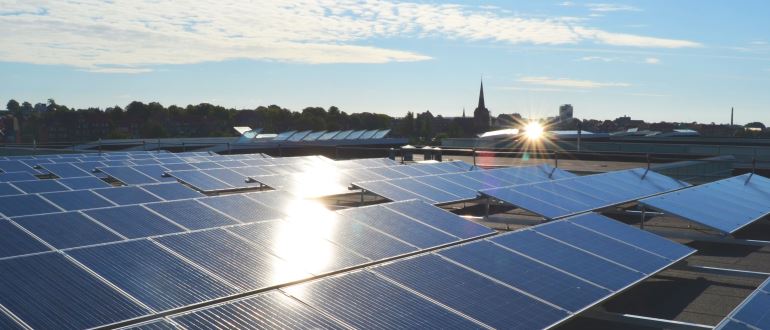The workshop combines theory and practice to give the students insight into solar energy and solar cells' function. The theoretical part introduces the students to solar energy, converting it into electricity and a discussion about pros and cons of solar cells. In the practical part, the students will conduct experiments with 50W solar panels to measure the electricity and the voltage, and will learn about the scientific methodology, hereunder repeatability. Afterwards, the students will analyse the data and create a I-V curve and a presentation on the results and a conclusion.
Theory
The workshop has both a theoretical and a practical part. In the theoretical part, students receive a basic introduction to solar energy, the theory of traditional and organic solar cells, solar energy, and the conversion of solar energy into electrical energy. We are happy to engage in a debate with the students about the usability of solar cells and solar energy, as well as the advantages and disadvantages.
The experiment
In this practical part, the student will conduct an experiment with 50W solar panels. The student will connect the panels to a variable resistor and a multimeter to measure both current and voltage. By adjusting the resistance to specific values for each measurement, the student will collect data for later analysis. The experiment will be repeated a few times to understand the concept of “repeatability” in scientific experiments. It’s a hands-on way to learn about solar energy!
Data processing
After the students have conducted the experiment with the solar panels, the data needs to be processed. If repeated measurements have been taken, the students will calculate an average of the measurements and assess the quality of the measurements. Then, an I-V curve is created, and using Ohm’s law, the students will prepare a presentation of their measurement results with a brief conclusion on the experiment and the characteristics they have determined.
Learning objectives
- Understanding solar energy theory and solar cell conversion.
- Conducting and analyzing solar panel measurements.
- Processing data and presenting results.
The exact date will be determined in consultation with you. However, it is crucial to find a time when our students are ready to hold the workshop for you. We always do our best to accommodate your date preferences.
You don't need to prepare anything to participate in this workshop.
Prerequisites for the workshop
Students should ideally have a basic understanding of Ohm’s law, current and voltage measurements, familiarity with concepts such as photons and electrons, and know how to use a multimeter. Knowledge and use of Excel are necessary.
The size of the groups depends on the number of students. The equipment for the experiment is sufficient for 9 groups. The recommended group size is 3-4.
Target group
The target audience for this workshop is high school students from the first year and up.
We hope that you, as the teacher, will actively participate on the day and help the instructors facilitate exercises and dialogue with the class. We also hope you will support the final evaluation so that we can continuously improve our programme.
The activity itself is free. However, we charge a transportation fee if we need to visit you outside the Region of Southern Denmark. If you come to us, you will cover your own transportation costs.

